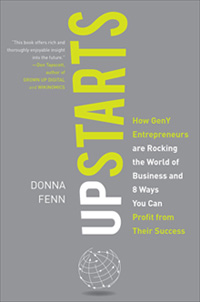In the world of business, the tried and true ways of starting a company are changing.
In her presentation at SXSW, Donna Fenn author of the book, Upstarts! GenY Entrepreneurs Are Rocking the Business World, will examine how GenYers are rewriting the entrepreneurial playbook one start-up business at a time.
What makes GenYers so different from their predecessors? The CEO’s of Generation Y are not only young but tech savvy, and they have a whole new way of communicating.
“They’re a very social generation and so they tend to start companies with partners, seek out advisors and mentors, tap into the resources of their colleges and universities, and generally draw in communities of vendors and customers into the larger visions of their companies, Fenn said. “I think this ultimately makes for stronger, more sustainable companies.”
Fenn, who has worked in business journalism for 20 years, says that young entrepreneurs are making an impact in just about every industry where technology can give them an advantage over the competition.
“Younger entrepreneurs tend to be collaborative, tech-savvy, and very agile. They’re also very socially conscious and focused on work/life balance and creating productive and fun workplaces,” Fenn said. “So I think those are all traits that entrepreneurs of every generation should take note of and attempt to emulate.”
GenYers also keep up with trends in social media. These tools help them communicate with customers, meaningfully and intimately. Social media helps build their business, by enabling them to create powerful brand identities.
“Look at what Tony Hsieh (Zappos) has done with Twitter – there’s no better example of how to use social media to your competitive advantage,” she said.
However, both young and old entrepreneurs have some knowledge to offer each other, she said. Older entrepreneurs have the knowledge that comes with experience. They are better negotiators, manage people better, and are not as easily distracted.
Fenn became interested in GenYers a couple of years ago.
“I began noticing more and more companies that were started by people in their twenties – more than I had ever seen in my twenty plus years in business journalism. I wanted to know what was driving them to start businesses, what kinds of companies they were starting, and if those companies were really so different from the ones I’d covered in the past,” she said.
The negative stereotypes of GenY are that they are spoiled and entitled, something that Fenn’s personal observations continually refuted.
“I have to admit that as a mother of two GenYers, I felt a little protective and possible defensive. My gut reaction was: wait a minute, this is an amazing generation of kids and I’m tired of hearing stories about how they all rely on their parents to micromanage their careers,” she said.
“I know that happens, but many of the young CEOs I spoke to were actually employing their parents and providing a major means of support to their families. That doesn’t sound entitled to me.”
Fenn’s advice to the college student who wants to create a startup of his/her own? Use what’s available to you to get ahead.
“Never again will you have as many free and valuable resources available to you as you have in college, so take full advantage of them. I’m talking about knowledgeable professors, possibly courses in entrepreneurship and/or on-campus incubators and entrepreneurship clubs, “she said.
Fenn also believes that the spirit of true entrepreneurship is purely based on your motivations.
“Entrepreneurship doesn’t always start with an idea. You’ve got to have passion for the entrepreneurial life – for building something that’s of value and that in some way will make life easier and better for the people your company touches, “she said.
“If you just want to get rich, forget it. Entrepreneurship is like journalism – it’ll make you miserable unless you love it so much that you can’t possibly imagine doing anything else.”
Fenn describes her book as a conversation starter on the topic of GenY and entrepreneurship.
“I hope that older readers come away with a new perspective on GenY and that they realize that this generation is doing business in a way that really does define the future of entrepreneurship for all of us,” she said. “And I hope that younger readers are inspired to pursue their own entrepreneurial dreams!”

